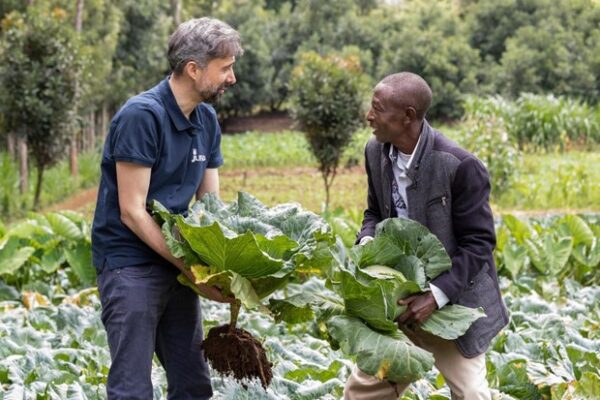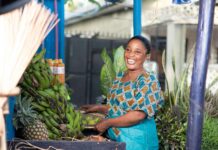More than 150 representatives from all five continents have gathered in Vitoria-Gasteiz, Euskadi, Spain to discuss the future of family farming, which provides food for 70 per cent of the world’s people. Among the experts present was Alvaro Lario, President of the International Fund for Agricultural Development (IFAD) of the United Nations and keynote speaker at the inaugural session of the VIII Global Conference. Family Farming: Sustainability of our Planet, organized by the World Rural Forum. Lario, the only Spaniard currently heading a United Nations agency, spoke to us about the challenges posed by climate change to small-scale family farming, in terms of their social value, diversity, inclusion and the next generation, as well as the role of innovation in the search for sustainability – the main topic of the conference.
Question. The United Nations is celebrating the Decade of Family Farming (2019-2028) with IFAD and the Food and Agriculture Organization of the United Nations (FAO) as co-leads. How important is family farming?
Alvaro Lario’s Answer. Family farming is the backbone of the rural economy everywhere in the world. Let me mention two facts that make it clear just how important it is. One, family farms produce 80 per cent of the world’s food by value. Two, more than two billion people depend on family farming for their livelihoods and food security. Let’s look at an actual example that may come as a surprise. In Ukraine, although the primary sector is characterized by large-scale export operations, it is the four million smallholder farmers who are feeding the country today, during this time of war. They produce up to 80 per cent of all dairy products, fruit and vegetables.
This conference marks the halfway point in the Decade of Family Farming. This is a key event in continuing to promote policies in support of family farming from every lens. Family farmers and their organizations are critical to achieve the objectives of the 2030 Agenda. Besides producing food, they perform key tasks in adapting to climate change, preserving biodiversity and managing natural resources – and they contribute to social cohesion and land stewardship.
- Are family farming and small-scale agriculture the same thing?
- They are synonymous 90 per cent of the time. Family farming is defined by who is managing and operating the farm, i.e. a family unit. Although medium-sized and large-scale family farms do exist, almost all of them are small farms that share the same issues with some regional differences.
IFAD invests in these smallholder producers in low-income and middle-income countries to enable them to overcome hunger and poverty, so that they can prosper and transform what they do, transitioning from a subsistence mentality to a profitable business. Over the past three years our investments have contributed to raising the incomes of 77 million people. These people are the present, and the future, of our food supply.
- Speaking of profitability, IFAD often says that farmers receive only 6.5 cents of every euro they produce in food. That is very little. What can we do to improve their incomes?
- We need to advocate short value chains to connect producers and consumers so that small family farms take home a larger share of the value they produce. This is the idea behind the “farm to fork” approach. Such policies serve to promote nutritious diets with local, high quality products. They also serve to raise awareness about the real cost of food, and of course the incalculable social value contributed by small-scale producers. Without family farming, we would not have eaten today. It is as simple as that.
We also need to help smallholder producers add value to their products. This is another way of making sure that farmers keep more of the value they produce. Farmers’ organizations play an important role by making use of economies of scale and their bargaining power with large-scale distribution.
- A key theme at the conference is the role of women and the next generation in an ageing sector
- It is a key theme. No question. Women are essential to family farming systems all over the world. Policies and investments need to address the existing gender gaps in terms of rights and property ownership. Women need to be able to access and control productive resources, services and markets and – crucially – decision-making, without this placing more of a burden on them.
And young people need incentives and opportunities that motivate them to carry on, and build upon, the legacy of their parents and grandparents. We can see this clearly in the so-called “youthquake” in Africa. Agrifood systems can provide unlimited opportunities for the millions of rural young people entering the workforce each year. Sadly, the alternatives are well known to us: unemployment, illicit activities, forced migration and social instability. In this sense, the World Rural Forum is a valuable way of sharing experience and knowledge with a new generation of family farmers.
- How is climate change affecting family farming?
- Climate change is having a very serious impact on small-scale farmers, especially those on the front line in countries with no capacity to deal with the intensification of extreme climate events such as drought and flooding. Family farming requires much more support in order to adapt to these changing climate patterns. Small-scale farmers receive less than 1 per cent of climate finance.
We can see this reflected in the farmers’ protests here in Spain. There is a reasonable consensus that climate change is the greatest challenge they face. If we do not listen to them, and give them decisive support, how can we persuade them to continue doing work that is neither profitable nor considered valuable?
Unless there is a significant change, more and more people will leave rural areas and we will increasingly be undermining the most fundamental of things: our ability to feed ourselves. Scientific evidence is very clear: climate change is destroying our ability to feed a growing global population.
- How can we deal with climate change without jeopardizing the sustainability of smallholdings?
- I would put it a different way. We can only guarantee the sustainability of smallholder farms if we deal with climate change in time. Agriculture has no future unless it is sustainable. Agricultural practices need to live alongside nature, coexist in harmony with its timelines and dynamics and not try to dominate it, much less deplete it. In this regard we have much to learn from the age-old knowledge of Indigenous Peoples.
There are no shortcuts with nature. Farmers know this better than anyone else. That is why we need greater support for adaptation to climate change. Many farmers are already identifying adaptation practices. We need to listen to them.
Innovation is a basic pillar of sustainability. Innovating is finding ways to make things better, to work more efficiently. This is a means to an end: improving people’s lives while being respectful of nature and living with it.
We also need to seek out social mechanisms that place a price – and then of course a value – on family farming activities. For example, we have several “ecosystem services for pay” initiatives whereby rural communities and smallholder producers are paid for the environmental work they do. In the Brazilian Amazon these payments incentivize the production of nontimber resources in line with traditional activities. This is an effective way of protecting the rainforest at the same time as promoting decent livelihoods.








